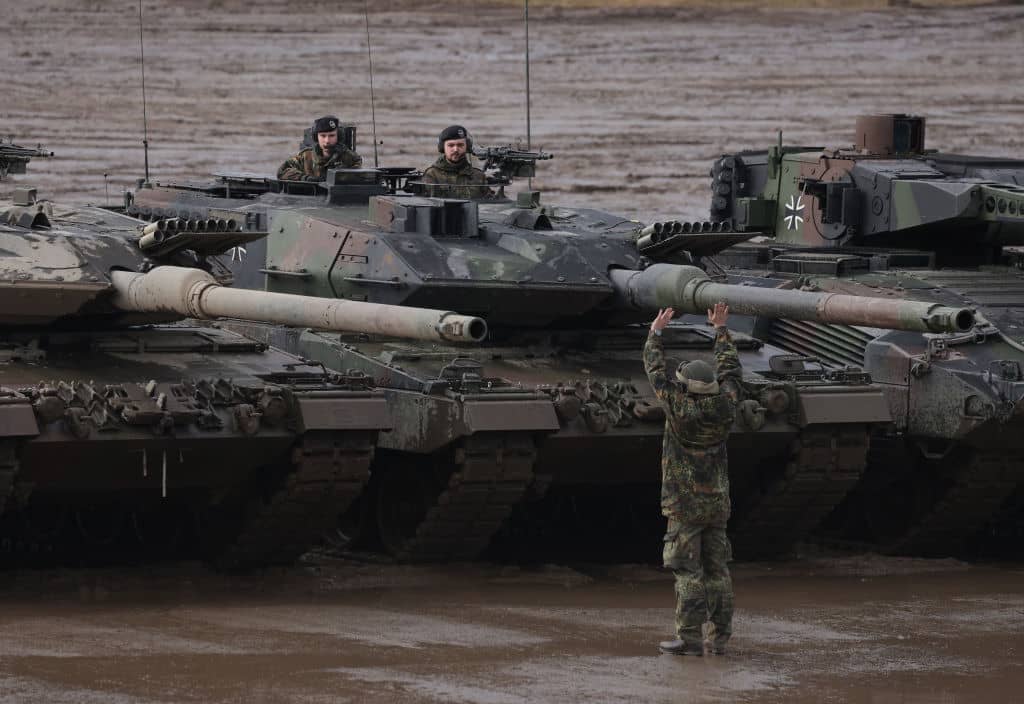Putin’s forces are currently steamrolling Ukraine’s defences, with Russian troops circling the capital and invading from the south and east of the country. Meanwhile European leaders, neutered by their military weakness, have been unable to do little more than offer pointless sanctions and statements of solidarity.
As Russian troops streamed across the border, European Commission President Ursula von der Leyen condemned the ‘unprecedented military aggression.’ When the Kremlin moved to recognise the Donetsk and Luhansk oblasts as independent states, the response in Brussels was to pass a fresh package of sanctions.
This was repeated in London, with Boris Johnson telling our ‘Ukrainian friends’ that ‘we are with you and we are on your side’ as his government passed Britain’s ‘most punishing sanctions to inflict maximum and lasting pain on Russia.’ In Washington, where the Biden administration is grappling with America’s retreat from the global stage, the White House signed a raft of sanctions to maximise on ‘long-term impact.’
In reality, not much can be done to maximise Ukraine’s short-term military response because European armies are a shadow of their former selves.
Europe can’t fight its way out of a crisp packet, let alone take on Russia’s dominant military
European leaders should have taken the 2014 invasion of Crimea as a wake-up call to rebuild and rearm their militaries. But under the comforting blanket of American protection, they squandered their military responsibilities. Putin didn’t. Russia’s army underwent a radical reorganisation to make it the most effective fighting force it has been in living memory. With the Syrian conflict providing an ideal testing ground for its updated weaponry and vehicles, 92 per cent of Russian Air Force personnel received combat experience. Russia has enhanced its discipline by cultivating a better-paid, better-trained military, and made its officer corps leaner, fighting for efficiencies in every corner. Russia has added firepower where it really counts, boasting an additional 1,000 aircraft in the last ten years and technologically upgrading its world-leading tank repertoire. By contrast, our forces have shrunk and, fatigued by failures in Afghanistan and beyond, have lost their cutting edge.
This stark separation in capability grew wider as tensions gently knocked up to full-blown war. With depleted armies and a limited appetite for fighting following two decades of disaster in the Middle East, our deterrent effect in eastern Europe was more or less non-existent.
The weakness of our governmental response has left a vacuum that has been filled with vapid, pointless gestures. The BBC has started using the name ‘Kyiv’ instead of ‘Kiev’, various national landmarks across the continent have been lit up in blue and yellow to show solidarity, and of course the Instagram story industrial complex is in full swing, with plenty of people keen to show a little sign of support. Embassies in Kiev launched a ‘meme war’ against the Kremlin, with the US embassy hoping to troll Putin into submission.
Our hopeless cocktail of memetic warfare and financial sanctions has been garnished by what can only be described as a dangerous puerility from Defence Minister Ben Wallace. In unguarded comments to British troops, Wallace boasted that his old regiment the Scots Guards had ‘kicked the backside’ of Tsar Nicholas I in 1853, adding: ‘we can always do it again.’
Except they cannot. In 2021, the Scots Guards were the most critically undermanned unit in the British Army, barely able to fill half their ranks. An internal report found that Britain’s infantry as a whole needed 14,984 soldiers, but only 11,301 were ready for deployment. The government responded to this problem by slashing the size of the infantry and the army in general in last year’s defence review.
When we can only offer this dwindling fighting force, the defence minister’s comments aren’t just silly, they’re scary.
His fantastical grandstanding has been matched by some of Wallace’s gungho Tory colleagues, who never shy from an opportunity to beat their chests with fantasies of British military action.
Tobias Ellwood, the chair of the Defence Select Committee, called for the imposition of a Nato no-fly zone over Ukraine. He gave scant details on how this could possibly be enforced. This is not even his first air war gaffe of the last year, with the ex-Army officer calling for Britain to deploy an aircraft carrier to landlocked Afghanistan as the Taliban toppled the Kabul government. He failed to provide clarification when it came to how British jets and bombers would gain access to the country via Pakistani airspace.
Not to be outdone on ill-considered bouts of sabre-rattling, David Davis jumped on Twitter this week to demand that we provide ‘air support to the Ukrainian army.’ Dipping into his vast knowledge of modern battlecraft, the ex-SAS reservist suggested that this ‘may neutralize Putin’s overwhelming armoured superiority.’
Unfortunately, neither Ellwood nor Davis took the time to note the state of Britain’s air forces. With barely seven frontline fighter jet units being fully operational, we would have little hope of tackling the hundreds of air defence units that Russia has sent into Ukraine or kept waiting in the border region.
If ministers were hoping to compete with Putin’s vast ground armour, perhaps they would have railed more aggressively against plans to cut our order of next-generation F35 fighters from 138 to just 48.
A look to our continental peers exposes similar signs of degradation and stagnation, with the latest German military report to parliament announcing that ‘less than half of the Eurofighters and Tornados [fighter jets] are airworthy and ammunition stocks have been reduced to a minimum.’
Anyone who reacts to news of the invasion with claims that we must ‘do more’ must reckon their desire with this cold, sober truth: Europe can’t fight its way out of a crisp packet, let alone take on Russia’s dominant military. To remedy this mismatch between rhetoric and capability, an urgent effort to rebuild our dilapidated defences must be put into action.






Comments